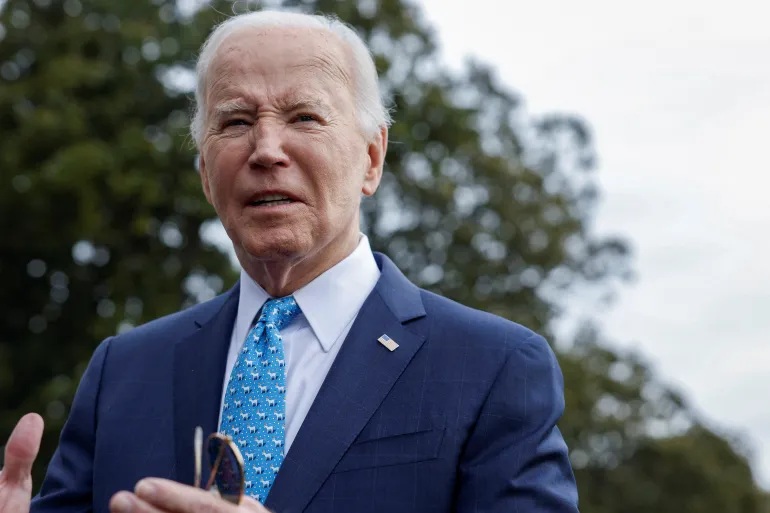WASHINGTON: President Joe Biden says he has decided on a response to a deadly drone strike on US forces in Jordan, but stressed he does not seek a wider war in the Middle East.
“Yes,” Biden told journalists at the White House on Tuesday when asked if he had decided on his response to the strike that killed three US troops at a military advance post near the Jordan-Syria border on Sunday.
The US president did not elaborate on his decision, which came after consultations with top advisers at the White House.
John Kirby, the White House national security spokesperson, told reporters on board Air Force One as Biden flew to Florida that the US could respond more than once.
“It’s fair for you to expect that we will respond in an appropriate fashion and it is very possible that what you’ll see is a tiered approach here, not just a single action, but essentially multiple actions,” he said.
The president previously accused Iran-backed groups of carrying out the first fatal attack on US forces in the Middle East since the start of Israel’s war on Gaza in October.
While he did not give further details on what actions he would take, when asked about concerns that taking on Iran could inflame a broader conflict he said, “I don’t think we need a wider war in the Middle East. That’s not what I’m looking for.”
Asked whether Iran was to blame for the attack on Jordan, Biden replied, “I do hold them responsible, in the sense that they’re supplying the weapons to the people who did it.”
He added that “we’ll have that discussion” when asked if a direct link to Iran had been established.
Tehran has said it had nothing to do with the attack and denied US accusations it supported armed groups behind the strike.
The 81-year-old US president is facing growing pressure during an election year, with Republicans urging the Democrat to punish Iran for the strike, some going as far as to call for direct attacks on Iran itself.
Biden’s administration believes hitting Iranian territory could cause the region to erupt, with strikes on Iranian-backed militias and possibly on Iranian Revolutionary Guard facilities in other countries more likely, US media reported.
The White House on Monday promised a “very consequential” response.
Tensions have escalated sharply in the region following the Jordan attack, already unstable after the October 7 Hamas attack on Israel and Israel’s devastating response in Gaza.
Fears have grown about the possibility of a regional conflagration amid attacks from Yemen’s Houthi rebels on Red Sea shipping and near-daily rounds of cross-border fire between Israel and the Lebanese armed group Hezbollah.
In recent weeks, Iran-backed armed groups have intensified their attacks on US military bases in Iraq and neighbouring Syria in response to the Israeli military campaign in the Gaza Strip.
The Iran-backed groups have described their strikes as retaliation for Washington’s support for the Israeli war on Gaza and say they aim to push US forces out of the region.
The US, in recent months, has struck targets in Iraq, Syria and Yemen to respond to attacks on American forces in the region and to deter Iranian-backed Houthi rebels from continuing to threaten commercial shipping in the Red Sea.
The Kremlin, a close ally of Tehran, on Tuesday called for a de-escalation in the Middle East.
“In our view, the overall level of tension is very alarming and, on the contrary, now is the time for steps to de-escalate tensions,” Kremlin spokesman Dmitry Peskov told reporters in Moscow.
“This is the only thing that can help us prevent further spreading of the conflict, especially the Middle East conflict, and somehow achieve de-confliction and de-escalation.”
China also warned against a “cycle of retaliation” in the Middle East.
Beijing has close ties with both Russia and Iran, with all three seeking to challenge what they say is Washington’s global hegemony.
Courtesy: aljazeera







